ClickTime is a popular time-tracking and project-management software, but it’s not right for every business. I review 5 of the best ClickTime alternatives to use now.
Time tracking software is crucial for accurately measuring the time your employees spend on work so you can pay them and bill your clients correctly.
ClickTime is a popular time-tracking software that includes project management tools and expense tracking. For those who would like to find out more about how ClickTime works and the pros and cons of this software, read more in our honest and in-depth ClickTime review. However, I think there are better platforms available. In this guide, I highlight 5 of the best ClickTime alternatives today.
Our Top Picks
-
1
The best alternative to ClickTime
-
2

Good for tracking time for collaborative teams
-
3

Good for ease of use
Why trust us?
Our team of unbiased software reviewers follows strict editorial guidelines, and our methodology is clear and open to everyone.
See our complete methodology
What Is ClickTime?
ClickTime is a time-tracking and project management software for small and medium-sized businesses. It helps you measure employees’ hours worked, track time off, and monitor employees’ business expenses.
ClickTime works reasonably well if all you need is to track time, but it offers limited functionality for putting your time data to work. There are only a few payroll integrations, and ClickTime doesn’t enable you to generate client invoices based on your employees’ billable hours. ClickTime also doesn’t offer any features to prevent employee time theft.
Why Are People Moving Away From ClickTime?
ClickTime users have reported an overall positive experience with the platform, as evidenced by the software’s 4.6-star rating on G2. However, some users have reported issues.
First, not all users like ClickTime’s user interface. One described it as “a bit clunky,” and another said that “the GUI [graphical user interface] could be little better than the current existing one.” Another user reported that ClickTime “is not very intuitive.”
Another issue some users reported with ClickTime? It doesn’t automatically prevent you from making errors in your timesheets. For example, one user said that there’s “little automation or error detection included” in ClickTime. Another said that “it occasionally deletes my time entries out of the blue,” which could potentially lead to missed hours.
Users also report issues with speed. One reviewer said that ClickTime “takes ages to load, so I need to invest at least 10 minutes to fill in my monthly timesheets.” Another user noted that “navigating from one week to another is slow.”
These issues are significant enough to drive many businesses to look for alternatives to ClickTime.
The 5 Best ClickTime Alternatives
-
Connecteam — The best alternative to ClickTime
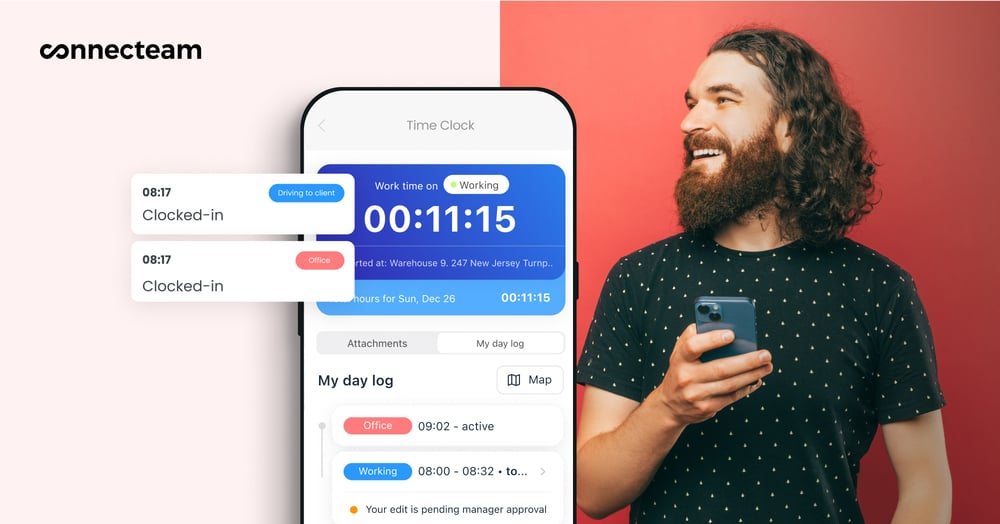
Connecteam is an all-in-one solution for time tracking, leave management, task management, scheduling, and more.
Why I chose Connecteam: Connecteam has a great user interface and is intuitive to use, and the mobile app works extremely well for employees in the field. It’s a powerful solution for keeping track of your employees’ hours and includes features to prevent time theft and run payroll seamlessly.
Here’s why I think Connecteam is the best ClickTime alternative.
Mobile time clock app
Connecteam’s employee time clock is available on web, iOS, and Android, and it works seamlessly whether your employees clock in from a desk or remote job site. It takes just a single click or tap to start tracking time.
Employees can assign time entries to specific projects or tasks, making it easy to track how hours are being spent. I also like that employees can also switch between jobs within Connecteam, so there’s no need to clock in and out multiple times each day.
Connecteam also lets employees mark hours as billable or non-billable, which is key for invoicing clients accurately. You can also require them to attach information about mileage, equipment, and more to their time entries.
They can also clock time for breaks with the break time app, or you can set up Connecteam to clock out employees for breaks automatically after a certain amount of time worked.
If an employee goes into unapproved overtime, Connecteam will automatically notify you. I appreciate that the overtime rules are highly customizable—so you can set different policies and pay rates based on local labor regulations or your company’s overtime policies.
GPS tracking and geofences
Connecteam’s mobile time clock uses a real-time GPS tracker, so time entries automatically include information about an employee’s location during their shift. Managers can view a breadcrumb trail, which is especially helpful for monitoring frontline employees who spend time driving between jobs.
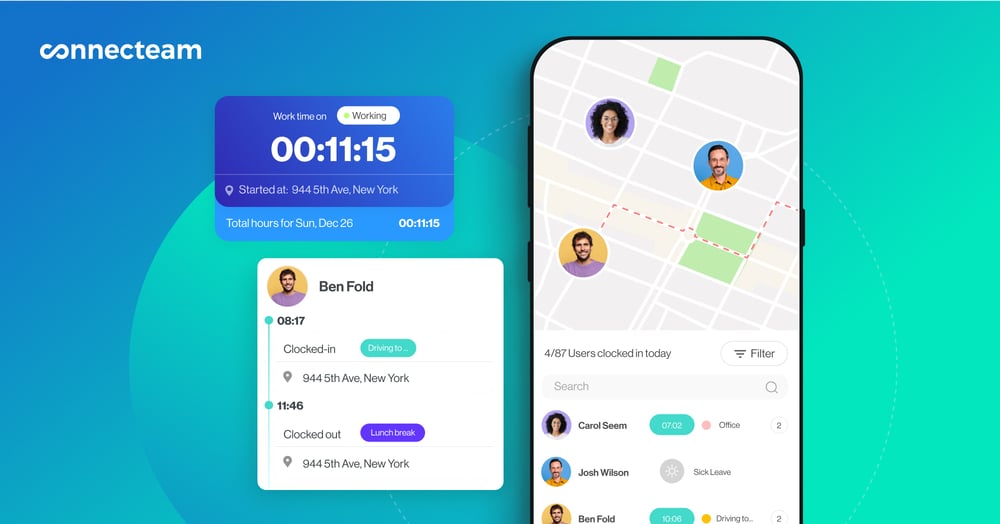
You can also set up geofences around your office or job sites. When geofences are activated, employees can clock in and out only from approved locations. Another feature I love? Connecteam sends employees push notifications if they leave a geofenced area with their time clocks still running—reminding them to clock out.
Kiosk clock-ins
You can also require employees to clock in and out at a centralized kiosk (like an iPad or a manager’s smartphone) using the kiosk app. Each employee receives a unique PIN code to clock in, which helps to prevent buddy punching. I also like that you can require employees to take a selfie when clocking in at a kiosk to prevent time theft.
Automated timesheets and reporting
Connecteam automatically puts employees’ time entries into timesheets for payroll they can review and send to managers for approval. I appreciate that you can decide whether to allow employees to edit their timesheets or to limit editing permissions to managers.
Timesheets automatically highlight any suspicious activity, such as time that may have been double-counted. Timesheets also flag if an employee missed required breaks or worked more or less hours than were scheduled. Need to investigate a time entry? See exactly when the entry was made and any changes made to it.
Connecteam offers customizable reports that let you see all your employees’ timesheets in one place. There’s also a pre-made report showing billable and non-billable hours so you can spot opportunities to increase revenue.
Invoicing and payroll integrations
Connecteam integrates with popular invoicing and payroll software including Gusto, QuickBooks, Paychex, and Xero. You can also set up custom workflows using Zapier.
These integrations make invoicing clients or running payroll using your approved timesheets easy.
Leave management
Connecteam’s time off management feature automatically tracks employees’ paid time off accruals and offers a seamless system for time off requests and approvals.
Employees can easily check leave balance and request time off right in the Connecteam mobile app. I find that approving and denying these requests is really straightforward for managers.

Connecteam includes various common leave types, including PTO, sick leave, and floating holidays. You can also define custom leave categories based on your company’s policies.
And many more features
Connecteam includes many more features, including a drag-and-drop employee scheduler, a task management system, and forms and checklists so employees can report back from the field in real-time. Connecteam also has an employee chat, making it easy for employees and managers to communicate about time entries and scheduling issues.
0Key Features
GPS-enabled mobile time clock
Support for kiosk clock-ins with selfies
Automated timesheet generation
Invoicing and payroll integrations
Leave balance tracking and time off requests
Pros
User-friendly mobile app for frontline employees
Automatic enforcement of policies around overtime and breaks
Tools and reports to prevent time theft
Automatic flagging of time conflicts, plus auditing tools
Cons
More integrations still on the way
Pricing
Free-for-life plan availablePremium plans start at $29/month for 30 users
14-day free trial, no credit card required
Start your free trial -

Toggl Track — Good for tracking time for collaborative teams
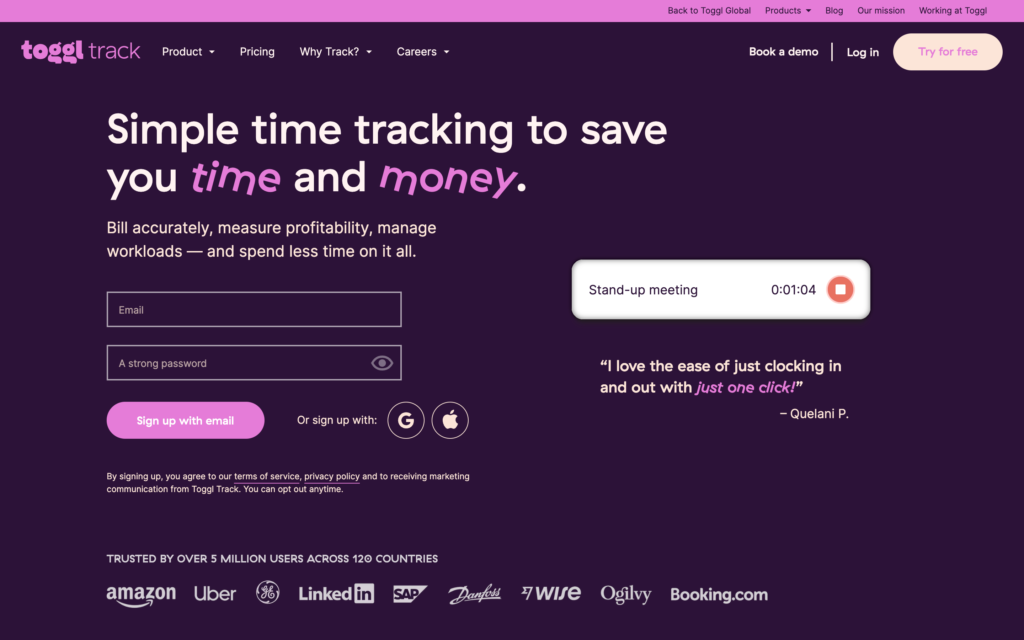
Toggl Track is a time-tracking tool with features for automating and sharing time entries, building timesheets, and invoicing clients.
Why I chose Toggle Track: Toggl Track offers a 1-click timer that makes it easy for employees to track tasks. It can also automatically record a timeline of employees’ activities, which they can turn into time entries to add to their timesheets.
Here’s more about Toggl Track.
Time tracking
Toggl Track offers a few options for time tracking. I found it easiest to track time using a 1-click timer, which employees can activate from the web or on mobile.
Alternatively, Toggl Track can automatically record time employees spend in different apps and on different websites in their browser. At the end of the day, your employees can use this timeline to manually assign time to the various tasks and projects they’re working on. The timeline interface was excellent, and I thought it made the work of filling out timesheets manually much easier.
If employees are working on a project collaboratively, one employee can create a time entry and invite their colleagues to it. I think this is really handy if your team typically works in pairs or small groups and you want everyone to have standardized timesheets.
Integrations
Toggl Track offers browser extensions for Chrome, Firefox, and Edge—plus integrations for more than 100 apps to record time spent in those apps automatically. Integration-based time tracking is available for communication tools like Slack, task management tools like Asana and Trello, and developer platforms like GitHub.
I also like that Toggl Track integrates with Google Calendar and Outlook so employees can view their time entries on their calendars.
Drawbacks
Toggl Track doesn’t offer any features to prevent time theft. There’s also no way to audit employees’ time entries, and the software won’t alert you if employees work overtime. Finally, while Toggl Track offers a mobile app for employees on the go, the tool is better suited for desk employees.
Key Features
- One-click time clock for web and mobile
- Ability to assign time to projects, tasks, and sub-tasks
- 100+ integrations for automatic time tracking
- Automated timesheets
Pros
- Very flexible analytics and reporting tools
- Support for offline mobile time tracking
Cons
- No features to prevent time theft
- No overtime alerts
Pricing
Starts at $9/user/month Trial: Yes — 30-day Free Plan: Yes — For up to 5 users
-

Harvest — Good for ease of use
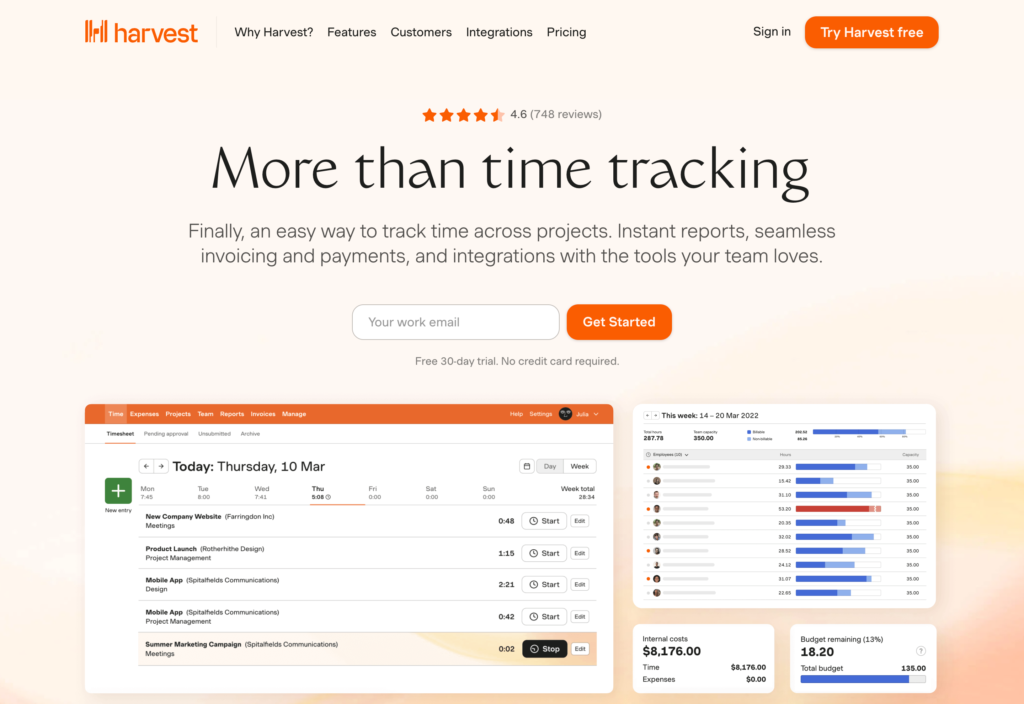
Harvest is an easy-to-use alternative to ClickTime with flexible reporting tools and automatic invoices.
Why I chose Harvest: Harvest offers a straightforward layout that’s easy for employees to navigate and has almost no learning curve. You can start tracking time with just a click or tap, and employees can view and edit their timesheets before submitting them for approval.
Here are some of Harvest’s key capabilities.
Time tracking
Harvest lets employees track time entries by client, project, and task—and mark every entry as billable or non-billable. Employees can view their time entries on a daily basis or on a weekly timesheet. I also like that the software lets you set up reminders so employees know to submit their timesheets ahead of payroll.
Reporting
Harvest offers visual reports that give you a clear overview of how much time your employees are spending on various projects. This is great for project managers, who can use this data to ensure project milestones are met on time and more. The reporting interface is really seamless and lets you compare time spent against time budgeted, see which employees are overworked or underworked, and monitor team performance. I appreciate that you can filter any of your data or export it to Excel for more in-depth analysis.
Invoicing
Harvest automatically creates invoices for your clients based on your employees’ billable hours. It supports PayPal and Stripe integrations so you can get paid online quickly, which I think is great for freelancers and independent contractors. Harvest also integrates with QuickBooks Online and Xero for accounting.
Drawbacks
Harvest may be too simple for businesses needing more advanced time tracking and workforce management features. It doesn’t include any features to prevent time theft, and there aren’t built-in integrations for running payroll based on employees’ timesheets. I also found that Harvest doesn’t offer tools for managing employee time off and doesn’t automatically enforce overtime or break policies.
Key Features
- User-friendly time clock for web and mobile
- Reminders to submit timesheets
- Customizable reports
- Integrations for PayPal, Stripe, QuickBooks Online, and Xero
Pros
- Platform is extremely easy to use
- Reports help you keep projects on budget
Cons
- No time off management
- No tools to prevent time theft
Pricing
$11/user/month Trial: Yes — 30 days Free Plan: Yes — Up to 1 seat & 2 projects
-

QuickBooks Time — Good for accounting and payroll integrations

QuickBooks Time is a time tracking service from QuickBooks that can be used on its own or in combination with QuickBooks accounting and payroll tools.
Why I chose QuickBooks Time: QuickBooks Time integrates seamlessly with QuickBooks Online, the popular accounting software and payroll platform. It also integrates with more than 50 other accounting and payroll tools and offers a really responsive user interface.
Here are some key features QuickBooks Time offers:
GPS time clock
QuickBooks Time enables employees to track time on any device, and the mobile apps (iOS and Android) use GPS so you can monitor employees’ locations when they’re working. I like that you can limit clock-ins to geofenced areas and send reminders to employees to clock out when they leave a geofenced area.
The QuickBooks Time app also automatically tracks mileage for frontline employees so you can account for fleet expenses.
Kiosk clock-ins
You can require employees to clock in and out on a centralized kiosk to cut down on time theft. Employees receive a personalized PIN for clocking in. You can also require them to take a selfie when clocking in at a kiosk.
Reporting
QuickBooks Time offers built-in reports that are quick to generate and easy to interpret. I like that the software makes it easy to compare budgeted time versus actual time across your projects, see which employees are spending the most hours on projects, and more. You can also export your time data to Excel for further analysis.
Drawbacks
QuickBooks Time doesn’t track time automatically or provide a calendar view of time entries to help employees verify their timesheets. It’s also lacking tools for keeping track of employees’ time off or attendance.
0Key Features
- GPS-enabled mobile time clock
- Kiosk clock-ins
- Customizable reports
- 50+ accounting and payroll integrations
Pros
- Geofences and selfies help prevent time theft
- Software is very easy for employees to use
Cons
- Doesn’t track time automatically
- Doesn’t offer time off or attendance tracking
Pricing
Starts at $20/month + $8/user/month Trial: Yes — 30 days Free Plan: No
-
Clockify — Good for advanced time reporting
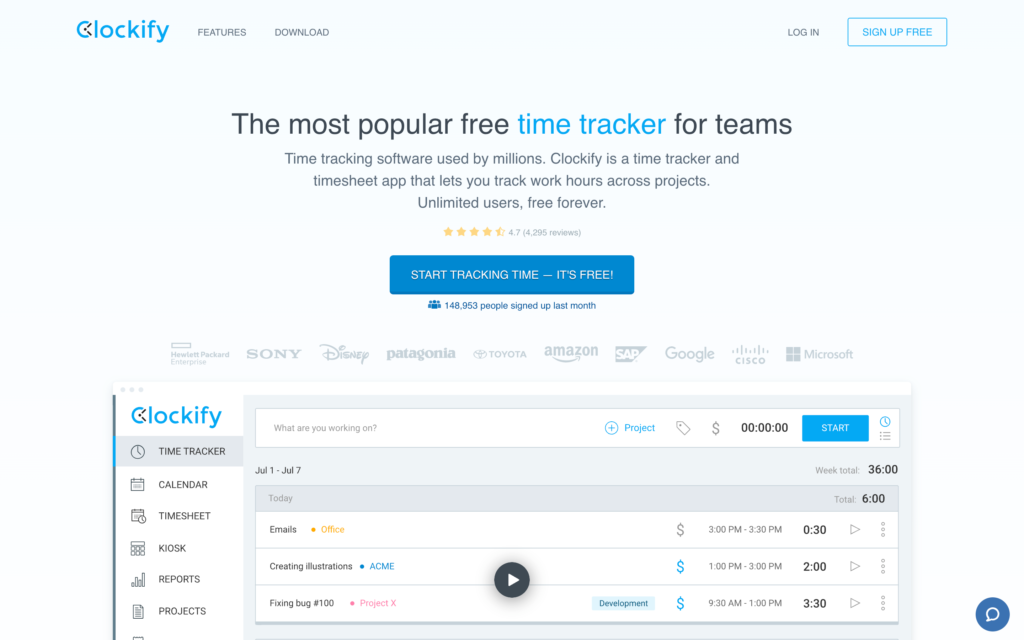
Clockify is a powerful ClickTime alternative that offers time tracking and much more.
Why I chose Clockify: Clockify is an all-in-one platform for businesses that need more than just time tracking. It offers tools for scheduling, time off management, expense management, and invoicing, plus customizable reports and integrations.
Here’s more about Clockify.
Time tracking
Clockify offers multiple ways to track time, including a list view where employees can start new time entries with 1 click. It also has a calendar view that enables employees to visualize time entries and spot gaps when they may have forgotten to track time.
I really like the automatic time tracker, which tracks how much time employees spend in various apps, making it easier to audit time entries. Clockify can also remind employees if they start working without starting a timer and automatically stop timers if employees are idle for a certain period of time.
Time off
Clockify also supports leave management. I love how easy it is to create custom policies for paid time off, sick leave, holidays, and more. Clockify also automatically tracks employees’ accrued leave balances, and a calendar view helps you visualize when employees are scheduled to be off work.
Reporting
Clockify offers a large number of pre-made reports that let you visualize how much time your team is spending on different projects, whether your projects are on budget, and how much money your company is making. The reports are highly customizable, and you can download your data in PDF, CSV, or XLSX formats.
Drawbacks
Clockify can be somewhat confusing to use at first, and I don’t think the platform’s navigation is very intuitive. Plan to spend some time learning the platform before rolling it out across your company. In addition, while the Clockify mobile app uses GPS, it doesn’t support geofences.
0Key Features
- One-click time clock with GPS
- Kiosk clock-ins
- Accounting and payroll integrations
- Time off management
Pros
- Very detailed reporting tools
- Automated features prevent time-tracking mistakes
Cons
- User interface is confusing
- Timer doesn’t support geofences
Pricing
Starts at $3.99/user/month Trial: Yes — 7 days Free Plan: Yes
Compare the Best ClickTime Alternatives
| Topic |
 Start for free
Start for free
|

|

|

|
|
|---|---|---|---|---|---|
| Reviews |
4.8
|
4.7
|
4.6
|
4.7
|
4.7
|
| Pricing |
Starts at just $29/month for the first 30 users
|
Starts at $9/user/month
|
$11/user/month
|
Starts at $20/month + $8/user/month
|
Starts at $3.99/user/month
|
| Free Trial |
yes
14-day
|
yes
30-day
|
yes
30 days
|
yes
30 days
|
yes
7 days
|
| Free Plan |
yes
Free Up to 10 users
|
yes
For up to 5 users
|
yes
Up to 1 seat & 2 projects
|
no
|
yes
|
| Use cases |
The best alternative to ClickTime
|
Good for tracking time for collaborative teams
|
Good for ease of use
|
Good for accounting and payroll integrations
|
Good for advanced time reporting
|
| Available on |
Final Thoughts on ClickTime Alternatives
While ClickTime remains popular for time tracking, users have reported the interface is clunky. In addition, ClickTime lacks automated features to flag time entry errors, and loading times can be long.
I think Connecteam is the best ClickTime alternative to use today. It offers a GPS-enabled time clock, seamless payroll integrations, and helpful features to prevent time theft. Connecteam also automatically enforces break and overtime policies, tracks employees’ time off, and much more.
Plus, Connecteam is completely free for businesses with up to 10 employees, and paid plans start at just $29 per month for up to 30 users.


